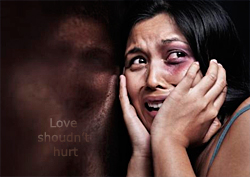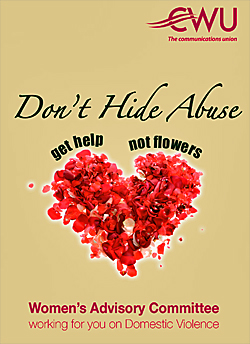 |
|
|
|
To the shame of the whole of the UK, domestic violence, domestic abuse, both mental and physical; has now been found to be endemic in all quarters of UK society. Ever present in England, Northern Ireland, Scotland and Wales.
Much ignored by TV news media, trivialised by news print media, under reported and still not taken seriously by the country's judiciary; Covid-19 has thrown the problem of the 'edpidemic' of domestic violence and mental health cruelty, into the eyes of newspaper and TV news editors like never before. The UK's only charity offering support for the victims of domestic violence and domestic mental abuse, says that Covid-19 presents unique problems for those living in an abusive environment. The charity has warned that the Covid-19 lockdown will have serious impacts on women and children experiencing domestic abuse and has called for coordinated government action in response. Over two-thirds of survivors responding to Women’s Aid survey in April 2020 told the national charity that domestic abuse is escalating under lockdown and 72 per cent said that their abuser has more control over their life since Covid-19. Nicki Norman Women’s Aid Acting CEO said:
However, significant changes are required to ensure this legislation delivers the transformation that survivors need. Women’s Aid has long called for the Bill to deliver a safe child contact and family court system, stronger housing rights to enable survivors to escape an abuser, and equal protection and support for migrant women. As Covid-19 shuts down routes to safety and support, these reforms are more needed than ever. Most urgently, the national network of domestic abuse services needs emergency cash, and a guarantee of a secure funding future, to continue delivering the life-saving support survivors need so desperately right now. Women’s Aid is calling for at least £48.2m in emergency funding to help local services cope during this crisis.” Before the age of Covid-19, whilst Trade Unions, The TUC, Hazards Campaign, Women's Aid, and Unionsafety website, were amongst those publicising the issues around the abuse of women, children, and men; the media have collectively been dismal by its negligence in reporting on this crime. Further, the continued sexism within the media and especially on-line media like the Daily Mail, which trivialises women and corals them into the right-hand column of lurid imagery on every page of its website, continues to promote misogyny. Now in the age of Covid-19 will all that change? Well, the mere fact that the media, academics and now even the Government, albeit forced, are speaking about the plight of women (and men) locked-down into the hell of that which they normally can escape from for a few hours at least through work; the country may be at least awakening to the crisis. There is a lot of on-line help and advice now being publicised. The CWU has in the past covered this serious issue with more recently the Union's Women's Advisory Committee and the North West Regional Women's Committee both issueing documentation aimed at highlighting the problem and encouraging and supporting those suffering domestic violence to escape from it, and to seek help. Often, it is the case that victims of mental abuse; are unable even to recognise that they are being abused, such is the control over them by the perpetrators, especially where children are living at home and emotional blackmail can be used to coerce the victim to remain and accept the abuse.
In it she promoted an updated version of a publication from the CWU Women's Advisory Committee entitled Don't Hide Abuse'' which was originally issued in 2010. This has always been also available from the Unionsafety E-Library when it first came out. Kate's letter to branches contains too a list of support agencies and it can be downloaded using the link at the end of this article. In her letter (LTB184/2020) to all the Union's Branches, Kate wrote: "As the coronavirus pandemic forces governments to take unprecedented steps to restrict peoples’ movements across the country, the CWU Equality, Education and Development Department have become increasingly aware of the rising number of victims of domestic/sexual violence and domestic/sexual abuse." Adding that the purpose of her writing is to help the Union's representatives, Safety Reps and Mental Health First Aiders to support members and to advice them as to the various support organisations and support information available in their local areas, Kate added: "CWU representatives are reminded that there may be signs that a member is a victim of domestic violence/abuse and these may be indicative of other concerns. Although we recognise that representatives are not trained counsellors or specialists in dealing with domestic/sexual violence or abuse, often members will not feel confident in speaking to management and may prefer to involve a trade union official or utilise the expertise of our equality representatives." In giving advice to those reps confident in helping an individual, or identifying a colleagues who may be suffering from domestic abuse, she wrote:
If a representative has reason to believe that a member is experiencing a form of domestic violence, domestic abuse and/or sexual violence, they should refer to their employer’s domestic violence/abuse policy/guidelines in the first instance and encourage members to report it to their line manager so that they can be properly supported." The final paragraph in her LTB184/2020, gave good advice when a victim of domestic violence wishes to report an incident to the police, but is unable to actually speak after dialing 999: If members are in danger and unable to talk on the phone, call 999, and then press 55. This will transfer them to the relevant police force who will assist without them having to speak. Equally, those seeking help on-line may wish to ensure their abused is unable to check on what they have been looking at on the laptops, PCs, I-pads, Tablets, and mobile phones. Women's Aid has this web page to advise victims how to secure their machine from giving away the websites and social media activity: cover-your-tracks-online Whatever a victim does, they should TURN OFF LOCATION TRACKING on their mobile phone too! Women's Aid, the only UK wide national charity for the victims of domestic abuse and violence, has specific websites for the nations within the UK and the Irish Republic: Scottish Women’s Aid They also host a Domestic Abuse Directory in which you can find support services for your area of the UK. You can download the CWU Women's Advisory Committee's booklet on domestic violence and the Women's Aid 'Safety And Wellbeing Advice For Survivors' booklet, along with other sources of advice and support, from this website's Unionsafety E-Library here Source: CWU / Women's Aid / unionsafety
|

 Whether it be in the form of domestic working slavery, sexual slavery via people trafficking, physical and mental abuse in the home; or through the sexual grooming of children, and sexual crimes, it appears that our society has an ever increasing serious problem.
Whether it be in the form of domestic working slavery, sexual slavery via people trafficking, physical and mental abuse in the home; or through the sexual grooming of children, and sexual crimes, it appears that our society has an ever increasing serious problem. “Our Survivor Survey gives voice to the women experiencing abuse, from former or current partners, and how they are affected by lockdown. Covid-19 has laid bare the lack of protection for women and children experiencing domestic abuse and demonstrates the urgent need for action. After years of delay, we welcome the Domestic Abuse Bill’s return to Parliament.
“Our Survivor Survey gives voice to the women experiencing abuse, from former or current partners, and how they are affected by lockdown. Covid-19 has laid bare the lack of protection for women and children experiencing domestic abuse and demonstrates the urgent need for action. After years of delay, we welcome the Domestic Abuse Bill’s return to Parliament.  In early April, and even before the increased coverage by the media into Covid-19 and the dire circumstances of those now locked-down at home with the perpetrator of such abuse; Kate Hudson, CWU's Head of Equality, Education & Development issued a letter to all branches within the Union with regard to these issues.
In early April, and even before the increased coverage by the media into Covid-19 and the dire circumstances of those now locked-down at home with the perpetrator of such abuse; Kate Hudson, CWU's Head of Equality, Education & Development issued a letter to all branches within the Union with regard to these issues.